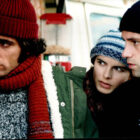Stefania Sandrelli, born on June 5, 1946, in Viareggio, Italy, is a renowned actress whose career spans over six decades, making her a quintessential figure in Italian cinema. Known for her versatility, Sandrelli has captivated audiences with her performances in a wide range of genres, from romantic comedies to intense dramas. Her contributions to film have earned her numerous awards and a place in the annals of cinematic history.
Early Life and Career Beginnings
Stefania Sandrelli entered the entertainment world at a young age. Her first break came when she won a beauty contest in her hometown, which led to her being cast in her debut film, “Gioventù di notte” (Youth at Night) in 1961. However, it was her role in “Divorce Italian Style” (1961), directed by Pietro Germi, that catapulted her to stardom. Sandrelli played Angela, a young woman entangled in a darkly comedic plot, showcasing her natural talent and setting the stage for a prolific career.
Iconic Collaborations and Roles
Sandrelli’s collaborations with some of Italy’s most esteemed directors have produced numerous iconic films. One of her most notable partnerships was with Bernardo Bertolucci. In “The Conformist” (1970), she played Giulia, the wife of a fascist agent, delivering a performance that blended vulnerability and complexity. This role remains one of her most celebrated, highlighting her ability to embody multifaceted characters.
In “1900” (1976), also directed by Bertolucci, Sandrelli portrayed Ada, a woman caught in the turbulent changes of early 20th-century Italy. The epic historical drama, which featured an international cast including Robert De Niro and Gérard Depardieu, further cemented her status as a versatile and powerful actress.
Comedy and Drama: A Balance of Genres
While Sandrelli has proven her dramatic chops, she is equally beloved for her roles in comedy. Her work with Ettore Scola in films like “We All Loved Each Other So Much” (1974) and “La terrazza” (1980) showcases her impeccable timing and charm. These films, which explore the intricacies of personal relationships against the backdrop of Italy’s social changes, benefited greatly from Sandrelli’s nuanced performances.
In the realm of drama, her role in “The Family” (1987), directed by Scola, stands out. Spanning several decades, the film examines the life of an Italian family, with Sandrelli’s portrayal of Beatrice capturing the enduring strength and complexity of her character.
Recent Works and Legacy
In recent years, Sandrelli has continued to take on diverse roles, maintaining her relevance in contemporary cinema. Her performance in “Christine Cristina” (2009), which she also directed, and her role in “The Great Beauty” (2013), directed by Paolo Sorrentino, are testaments to her enduring talent and adaptability.
Stefania Sandrelli’s legacy is marked by her remarkable ability to navigate between genres and characters with ease. Her contributions to Italian cinema have not only entertained audiences but also provided profound insights into the human condition. Sandrelli’s work remains a touchstone for both contemporary and future filmmakers and actors, ensuring her place as a timeless icon in the world of film.
Stefania Sandrelli’s illustrious career reflects her dedication to her craft and her exceptional range as an actress. From her early days as a teenage star to her mature roles in critically acclaimed films, she has consistently demonstrated a profound ability to connect with audiences. Her work continues to inspire and influence, solidifying her status as one of the most important figures in Italian cinema history.
Watch her movies on Movieitaly+
Read more articles here!






